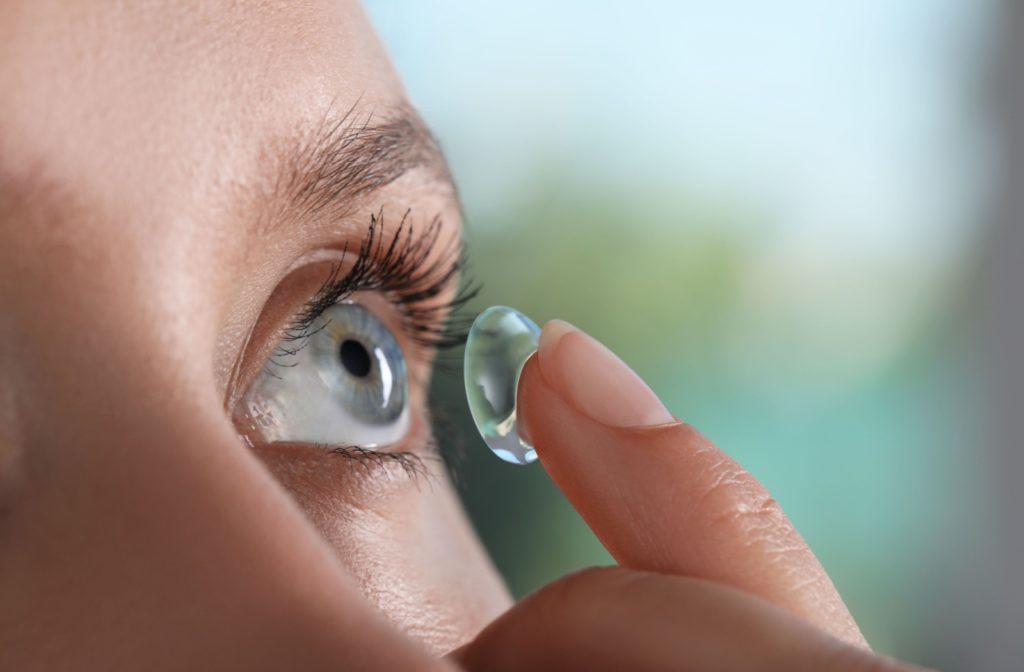Contact lenses are among the most common tools for vision correction. They allow for clear vision without glasses, but require more maintenance in return.
Soft contact lenses are designed to be worn for a fixed period before replacing the lens. While contact lenses themselves don’t expire, the solution they sit in does.
Contact lens prescriptions expire annually. Annual contact lens exams and fittings are required for a new supply of lenses.
Soft Contact Lenses
Soft contacts are among the most common lenses.
Soft contacts are made from a flexible, gel-like plastic material that contains water, which allows oxygen to pass through the cornea. This provides comfort to the wearer and reduces the chance of dryness.
The delicate material of soft contact lenses requires regular cleaning and proper handling to avoid irritation and infections. These lenses absorb water to prevent the lens from drying out. This feature helps the lens attract debris like dust, bacteria, protein, and lipids.
Why do Contact Lenses Expire?
In fact, it’s not the lens that expires, but the saline solution that the contact is packaged in. Over time, this solution can evaporate or change composition, making the lenses less effective or unsafe for wear.
Contact lenses are packaged in sterile environments to prevent bacterial contamination. The sterility of the packaging has a limited shelf life. The packaging on the contact lens box shows the date it was manufactured and the expiry date. Generally, the expiry date is four years after the lens was manufactured and packaged.
The four-year viability window is only applicable if the package remains unopened.
Soft contact lenses can be worn daily, bi-weekly, or monthly. To maintain healthy eyes and vision, prevent eye discomfort, and increase the risk of infections, it’s advised that individuals only wear their contacts for the prescribed period.
It’s important to abide by the appropriate wear schedule for soft contacts. Over time, the materials in soft contact lenses can degrade. This affects their performance, comfort, and safety.
Individuals who use biweekly or monthly lenses should replace their contact lens solution regularly. After opening the solution, it’s viable to use for 90 days. After 90 days, the contact lens solution should be thrown out and replaced.
In addition to replacing the contact lens solution, the contact lens case should also be cleaned regularly and replaced every 90 days.
Contact Lens Prescriptions & Expiration
Contact lens solution expires, and contacts themselves should only be reused and replaced according to their specific schedule. Contact lens prescriptions expire annually. A valid contact lens prescription is required to order a new supply.
Visiting your optometrist for annual comprehensive contact lens exams is important for several reasons, including assessing the health status of your eyes, updating the contact lens prescription, and verifying the fit and comfort of your lens.
Your vision can change over time, and an annual exam can confirm that your prescription is up-to-date. Wearing outdated contact lenses can lead to eye strain and potentially worsen your vision.
Regular check-ups confirm that your eyes remain healthy enough to continue wearing contact lenses. Your optometrist will assess your tear film and recommend lenses that are compatible with your level of eye moisture, reducing the risk of dry eye symptoms.
Our eyes vary in shape and size. Contact lenses vary accordingly. During the fitting of your lens, the optometrist makes sure that the contacts fit snugly over the cornea. Misaligned lenses can result in blurry vision.
A contact lens fit helps maintain comfort and prevents the lens from moving excessively. Annual fittings help ensure that your lenses are comfortable throughout the day. Ill-fitting lenses can cause several concerns, such as eye irritation, infections, or corneal scratches.

What Happens if You Wear Expired Contacts?
Wearing outdated contact lenses or overwearing lenses beyond their intended use can lead to issues concerning your vision and ocular health:
- Reduced Vision Quality: Wearing an outdated contact lens prescription can lead to cloudy or blurry vision, impact the tear film, or cause the contact to lose its’ shape, resulting in impaired vision.
- Increased Risk of Infection: Overwearing contacts beyond their intended schedule can lead to debris buildup like bacteria, dust, lipids, and proteins, which increases the risk of developing eye infections such as keratitis.
- Discomfort and Irritation: Overwearing contact lenses can lead to the lens losing its spherical shape. This can cause discomfort, dryness, and irritation, making it difficult to wear the lenses.
- Long-Term Damage: Prolonged use of expired or overworn lenses can lead to serious concerns such as corneal abrasions, ulcers, and potentially long-term damage to your eyes.
For instance, overwearing a pair of monthly lenses for six months increases the risk of bacterial contamination, reduces oxygen permeability, and degrades the integrity of the lens, all of which can lead to severe ocular issues.
Proper Contact Lens Use
Following proper contact lens wear and care guidelines reduces the risk of eye discomfort and irritation, and reduces the risk of developing serious ocular complications.
- Wash your Hands: Before handling your lenses and touching your eye, wash your hands thoroughly with soap and water.
- Follow the Wear Schedule: Follow the recommended wear schedule to avoid over-wearing your lenses.
- Clean your Contacts: Always use the recommended cleaning solution. Avoid tap water or saliva as these can introduce harmful bacteria. Contact lens solution is viable for 90 days upon opening. Rinse and clean your contact lens case after every use. Always add new lens solution when storing your lenses away in their case.
- Storage: Store lenses in a clean contact lens case and replace the case every 90 days to reduce debris and bacteria buildup.
Book an Appointment
Understanding the expiration and proper care of your contact lenses is important for maintaining good ocular health and vision.
If you experience any discomfort or irritation while wearing your contacts, connect with your optometrist. Contact our team at The Eye Gallery to schedule your contact lens exam and fitting.




